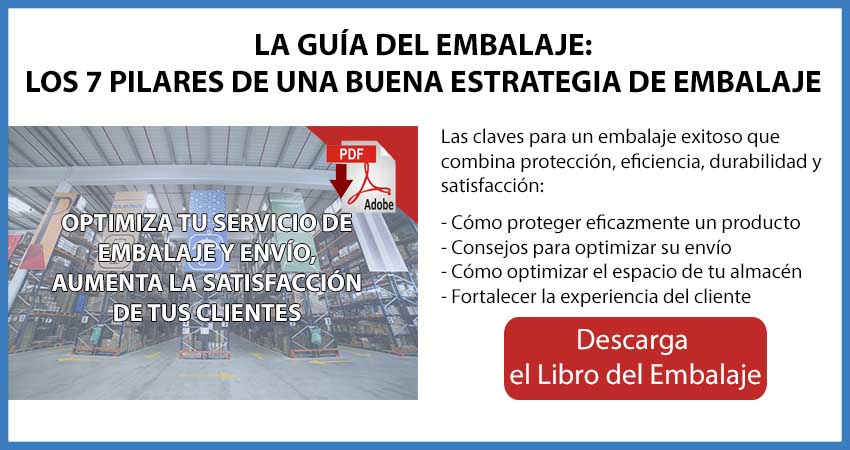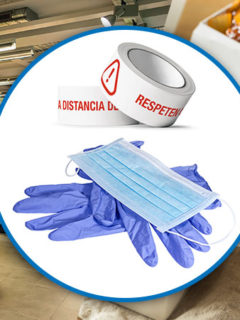Adhesive tape is a product whose importance is often underestimated, yet it contributes greatly to the security of packages. It not only allows you to close a box, but also serves to mark it and prevents attempts to open or steal a package. But how to choose, apply and preserve this important ally to ensure that your shipments arrive safely? Follow our guide to good practice and get answers to all your questions
- which adhesive tape do you need?
- how to use adhesive tape on a parcel?
- Care to take into account for adhesive tapes
- how do I know if my parcel has been opened?
- Overview
what adhesive tape do you need?
Polypropylene acrylic, solvent or hotmelt tape, gummed tape, paper tape… Are you unsure? It’s not always easy to find the adhesive tape that suits your needs. But we’ll tell you the secret: the choice of adhesive depends mainly on the weight and material of the parcel
- Polypropylene adhesive tape with acrylic glue for medium and heavy loads, resistant to temperature variations and UV rays, and compatible with a wide variety of surfaces (recycled cardboard…);
- Polypropylene adhesive tape with solvent glue: the most common type of adhesive tape, its adhesive is more resistant to temperature and humidity variations;
- Polypropylene adhesive tape with water-based hotmelt adhesive for heavy loads. It is resistant to abrasion and stretching;
- PVC adhesive tape with solvent adhesive can only be used at room temperature and for packaging up to 25 kg.
You can also choose a customised adhesive tape, which makes the closure of your packages unique and deters anyone with an interest in opening it during shipment because this tape cannot be replaced.
what are your needs and requirements for sealing your boxes?
| Recycled cardboard box | Boxes filled to overflowing or with raised flap effect (triple channel) | Aesthetic closure | High security closure with opening signs |
|
|
|
|
table 1: Choose your adhesive tape according to the type of box
What are the storage or transport conditions of your goods?
| Long-term storage | Exposure to high humidity | Low temperature storage or export to cold countries | UV exposure and export to hot countries |
|
|
|
|
 |
 |
 |
 |
table 2:
Choose
your adhesive tape according to the conditions of the package
How to use adhesive tape on a package?
Closing
With a manual adhesive dispenser, the task is simplified. Adhesive tapes need sufficiently strong pressure to adhere to the surface, otherwise they can come off at any time or form creases. Do not hesitate to press it firmly during the application of the tape.
How to close boxes effectively?
- L-shaped closure for very light products, consisting of placing tape at each end of the box where the flaps overlap and overflowing slightly to the sides, perpendicular to the opening of the box.
- U-shaped closure for the transport of heavy or light products but with long transport times. It consists of placing the adhesive tape along the entire length, where the flaps meet, at the top and bottom of the box and overflowing to the adjacent side.
- Combined L- and U-locking allows the transport of heavy products over a long period of time by crossing the adhesive tape over the entire length and width of the carton ends.
- The H-closure is the most secure closure, it consists of placing the tape along the entire length of the carton (on the flaps) at the top and bottom, but also across the width and at all four ends of the carton. The reinforced tape can also be added across the carton in the middle.
| Lightweight packages up to 25 kg | Packages up to 35 kg | Heavy packages from 35 kg and above or bulky packages | |
| which tape to choose? | Choose a 28 micron PVC or polypropylene tape, adhesive paper or gummed tape | Choose a 32 micron PVC or polypropylene tape or a gummed band | Choose a PVC or polypropylene tape with a minimum of 40 microns, reinforced tape or reinforced gummed tape |
| how to use the tape? | Make a simple closure with 2 strips | Make a reinforced closure with 6 strips | Make the closure with 70 or 75 mm wide adhesive tape and a complete closure with 6 strips. |
| Example photo | 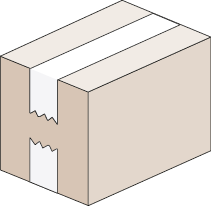
U-locking |
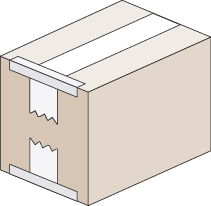
L+U-locking |
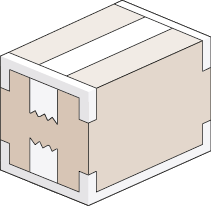
H-lock |
care to keep in mind for adhesive tape
Adhesive tape needs special care: it should be stored away from humidity and at room temperature. It is best to leave it in its original packaging and protect it from light. Store it in an upright position so that the end of the adhesive is stuck under the roller. If you have several rolls of tape, keep the silicone paper that protects them from each other. This will prevent them from sticking together. On average, you can keep adhesive tape for one year. Beyond that, the glue may stop working. Remember to check the production date on the batch numberA tip: Measure your stock of adhesive tape accurately – you should have enough so that you don’t run out and still manage to use them before their expiry date.
how do I know if my package has been opened?
Theft of goods is a common problem in maritime transport systems. How to avoid it? With “tamper-evident” tapes
- The gummed paper makes tearing off very difficult and visible;
- High security tape leaves a theft message;
- Reinforced strapping makes access difficult, but requires more time; It is also not suitable for a mode of transport such as the Post Office, as the package could stick together and break;
- The opaque security bag displays the message “VOID FRAUD” to any attempt to open it.
as you have seen, the world of adhesive tapes is more complex than it seems. Thanks to these tips you will be able to adopt good practices and get your packages shipped more securely
Three key points to remember:
- Choose your tape according to the weight, materials and shipping method of your parcel: the types of tape available on the market offer different types of glue adapted, for example, to climatic elements or types of box.
- Manual or mechanical sealing: don’t forget that a certain amount of pressure must be exerted to ensure that the adhesive adheres well to the box. Taping machines are very helpful in exerting this pressure.
- Use customised or reinforced security tapes to prevent theft during shipping.
header image source: Thinkstock©











